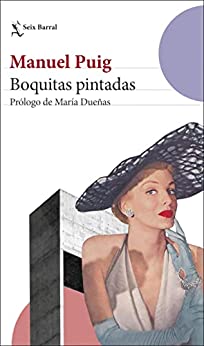
Manuel Puig, the author rejected by the Latin American Boom
Seix Barral celebrates the 90th anniversary of the Argentine writer by reprinting nine of his most important novels
Boquitas pintadas (Heartbreak Tango), The Buenos Aires Affair, El beso de la mujer araña (The Kiss of the Spider Woman)... These are some of the best-known titles by Argentine author Manuel Puig that Seix Barral Publishing House has just reissued to coincide with his 90th birthday.
Considered a 'rara avis' of Hispanic literature, Puig published his first novel, La traición de Rita Hayworth (1968), coinciding with the outbreak of the Latin American literary boom, a movement in which he never fit, as noted by the critic Miguel Lorenci in the newspaper Las Provincias.
Capable of configuring his own style, he was highly criticized for integrating several references to popular culture, as well as a strong presence of female characters and the LGBTQ+ community, into his novels.
Seix Barral has now reprinted nine of his novels, always brave and different, with a defiant modernity, which placed him a step ahead of his contemporaries, as if he came from the future.
Arranged in chronological order, the first is La Traición de Rita Hayworth (1968) (Betrayed by Rita Hayworth), a novel full of autobiographical overtones inspired by the suffocating provincialism of his childhood, which tells the story of a young man who feels different from others, and whose only window to the world is the screen of a movie theater.
Like the protagonist, Puig spent his childhood in his small hometown, and then emigrated to Buenos Aires to complete his high school studies. After beginning different higher ed studies, he chose to train in cinematography, for which he moved to Italy. He did not complete his training and ended up working as a writer. He lived in Rome, Paris, London, Stockholm, Mexico, New York, Rio de Janeiro and Cuernavaca. Puig assumed his homosexuality from a young age, but he did not believe that sexuality was something that defined a person's identity.
"Repudiated by a large part of the Latin American boom and academic critics for considering that he trafficked in sentimentality and cheesiness, Puig defined himself as a defender of individual freedom who was interested in "revealing the impostures, simulations and concealments that deeply damage us, while at the same time building affective bridges and forging emotional ties with strangers, combining the pleasure of entertainment with social denunciation," writes Antonio Lozanos in the Barcelona daily La Vanguardia.
Another of his star novels republished by Seix Barral is Boquitas pintadas (Heartbreak Tango) (1969), with a prologue by the writer María Dueñas, which mixes passion, crime and "family secrets to the rhythm of tango and bolero."
 a
a
This title was followed by The Buenos Aires Affair (1973), with a prologue by writer Mario Mendoza. It is a detective novel with political and sentimental overtones that was not well received in Argentina, and was censored, forcing the author to go into exile.
Most of these novels have been translated into English.
RELATED CONTENT
The books:
- El beso de la mujer araña / Kiss of the Spider Woman
Prologue by Antonio Muñoz Molina
- La traición de Rita Hayworth / Betrayed by Rita Hayworth
Prologue by Bob Pop
- Pubis angelical / Pubis Angelical
Prologue by Camila Sosa Villada
- Boquitas pintadas / Heartbreak Tango
Prologue by María Dueñas
- The Buenos Aires Affair / The Buenos Aires Affair
Prologue by Mario Mendoza
- Cae la noche tropical / Tropical Night Falling
Prologue by Tamara Tenenbaum
- Sangre de amor correspondido / Blood of Requited Love
Prologue by Paulina Flores
- Maldición eterna a quien lea estas páginas / Eternal Curse on Reader of These Pages
Prologue by Claudia Piñeiro











LEAVE A COMMENT:
Join the discussion! Leave a comment.